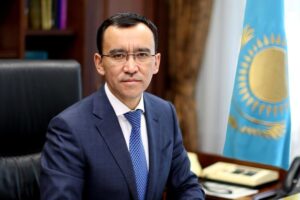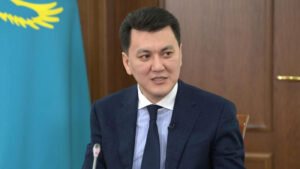ASTANA – Maulen Ashimbayev, the chairman of the Senate, an upper house of the Kazakh Parliament, spoke about President Kassym-Jomart Tokayev’s commitment to the principles of openness, constructive dialogue, and a listening state, outlined in his interview with Ana Tili newspaper on Jan. 3.

Maulen Ashimbayev, the chairman of the Senate, an upper house of the Kazakh Parliament. Photo credit: inform.kz
“Current issues are not hushed up, but on the contrary, are openly and honestly discussed,” Ashimbayev wrote on his Facebook page.
Ashimbayev noted Kazakhstan’s progress as a socially responsible state focusing on economic reforms aimed at improving citizens’ living standards. He also noted legislative support for the reforms and commended the solidarity of Kazakh citizens during events such as last year’s spring floods and the Mangystau plane crash.
“In the international community, Kazakhstan is strengthening its role as a stable and responsible state, putting forward important initiatives and developing cooperation with other countries. All this contributes to strengthening the country’s status as a middle power, making a significant contribution to ensuring international security and global development,” Ashimbayev commented.
According to State Counselor Erlan Karin, Tokayev reflected on achievements in 2024 while addressing pressing societal issues, including the time zone, the nuclear power plant (NPP), the dollar exchange rate, the Talgar events, and talks on early elections.
The President emphasized continuing reforms, urging joint effort and societal unity to address the challenges. Karin said this format is useful for both government agencies and society, as it helps to understand state policy goals and shows the government’s vision.
Financial analyst Andrey Chebotaryov reaffirmed the government’s commitment to the Strong President – Influential Parliament – Accountable Government framework and dismissed the possibility of transitioning to a parliamentary republic. He also pointed to the ongoing promotion of the Kazakh language and creative industries while maintaining interethnic harmony.
According to Chebotaryov, the intention to establish an international consortium for the construction of the NPP, including the necessary tender procedures this year, has been confirmed. Moreover, Kazatomprom will possibly participate as the general operator, which is intended to support Kazakhstan’s national interests in this project as much as possible.
Kazakhstan’s multi-vector foreign policy remains a cornerstone. Chebotaryov added that Tokayev emphasized strengthening ties with China and Russia while advancing the country’s role in the Organization of Turkic States. He also underlined Kazakhstan’s strategic partnership with the United States, citing the importance of his discussions with President Donald Trump.
Bekzhan Sadykov, the head of the European and American Studies Department at the Kazakhstan Institute of Strategic Studies (KazISS), also elaborated on Kazakhstan’s foreign policy, highlighting multi-vectorism as one of its most important principles. It allows finding a balance between the interests of different global players, such as Russia, China, the U.S., the European Union, and others, minimizing risks and maximizing benefits.

Bekzhan Sadykov, the head of the European and American Studies Department at the Kazakhstan Institute of Strategic Studies. Photo credit: kisi.kz
“Kazakhstan’s strategic interest is to stabilize the region, strengthen economic ties and security. Kazakhstan actively promotes ideas of regional cooperation through various platforms,” Sadykov said.
Ecology, climate change, energy security, and digital transformation remain important areas. Kazakhstan, as a middle power and a state with a pragmatic foreign policy, is interested in sustainable development and cooperates with partners within international organizations; and participates in global initiatives aimed at combating climate change, preserving biodiversity, achieving food security, among others.
Sadykov noted Kazakhstan’s success in attracting $15.7 billion in investments – leading the North and Central Asia region – through initiatives focused on clean technologies, renewable energy, and modernizing infrastructure.
Sadykov concluded that Kazakhstan’s participation in international platforms enhances its ability to address critical issues such as water resources, ecology, and migration while promoting regional security.


